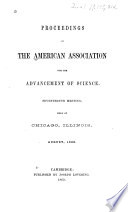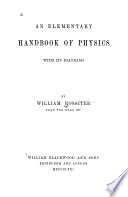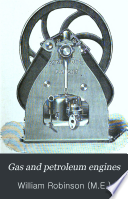 | American Association for the Advancement of Science - 1869 - 432 pages
...nature of heat, the cause of its " repulsive agency," and the reasons for the changes of condition from the solid to the liquid and from the liquid to the gaseous condition, which continued additions of heat produce upon matter. If we suppose the atoms of all bodies to be... | |
 | William Rossiter - 1871 - 420 pages
...described at page 66. The fire has, we should say, melted the lead or the ice — meaning that the change from the solid to the liquid, and from the liquid to the vapour condition, had been brought about by the influence of the fire. But there has been no contact... | |
 | William Rossiter - 1871 - 444 pages
...described at page 66. The fire has, we should say, melted the lead or the ice — .meaning that the change from the solid to the liquid, and from the liquid to the vapour condition, had been brought about by the influence of the fire. But there has been no contact... | |
 | Isaac Todhunter - 1877 - 450 pages
...change of volume which is produced when heat is applied to a body; and also to the change of state from the solid to the liquid, and from the liquid to the gaseous form, under the same agency: we now propose to consider how we may obtain an estimate of the quantity... | |
 | 1854 - 606 pages
...with water and dried. The general operation of heat upon all matter tends to convert it successively from the solid to the liquid, and from the liquid to the gaseous form. But decomposition does not frequently take place, unless extraneous matter be present. An increase... | |
 | 1882 - 596 pages
...of matter to the fourth stale is but a result of the continuation of the process by which it passes from the solid to the liquid, and from the liquid to the gaseous state. He showed that the limits of size of molecules is very well known, and illustraied by saying... | |
 | Royal Meteorological Society (Great Britain) - 1884 - 408 pages
...The credit of the suggestion of both of the points now used, the epochs of change of state of water from the solid to the liquid, and from the -liquid to the vaporous conditions respectively, belongs to our countrymen. Kobert Hooke, who, as my predecessor told... | |
 | William Robinson (M.E.) - 1890 - 658 pages
...own latent heats of fusion and vaporisation ; namely, the quantities of heat necessary to change it from the solid to the liquid, and from the liquid to the gaseous state. Andrews gives the following results of careful determinations at the ordinary atmospheric pressure... | |
 | Massachusetts Horticultural Society - 1891 - 966 pages
...common substances with which we are familiar. Fifth. Heat is absorbed, or disappears, during changes of bodies from the solid to the liquid, and from the liquid to the gaseous or aeriform state ; it is also thrown out or rnade apparent again as these conditions are reversed.... | |
 | Massachusetts Horticultural Society - 1892 - 908 pages
...common substances with which we are familiar. Fifth. Heat is absorbed, or disappears, during changes of bodies from the solid to the liquid, and from the liquid to the gaseous or aeriform state ; it is also thrown out or made apparent again as these conditions are reversed.... | |
| |